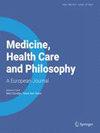Menstrual pain and epistemic injustice.
IF 3.1
2区 哲学
Q1 ETHICS
Medicine Health Care and Philosophy
Pub Date : 2025-09-01
Epub Date: 2025-04-05
DOI:10.1007/s11019-025-10266-7
引用次数: 0
Abstract
In this paper I analyze the phenomenon of normalizing and tabooing menstrual pain as an example of epistemic injustice. I refer to both types of epistemic injustice distinguished by Miranda Fricker: testimonial injustice and hermeneutic injustice. The social approach to the phenomenon of menstrual pain combines both. This poses a significant political and bioethical problem, as ignoring and misunderstanding the experiences of menstrual pain sufferers can contribute to delayed diagnosis and reinforce patients' sense of loneliness.
经期疼痛和认知不公。
在本文中,我分析了正常化和禁忌月经疼痛的现象,作为认识不公正的一个例子。我指的是由米兰达·弗里克(Miranda Fricker)区分的两种类型的认识论的不公正:证言的不公正和解释性的不公正。社会对经期疼痛现象的看法将两者结合起来。这带来了一个重大的政治和生物伦理问题,因为忽视和误解经期疼痛患者的经历可能导致诊断延误,并加剧患者的孤独感。
本文章由计算机程序翻译,如有差异,请以英文原文为准。
求助全文
约1分钟内获得全文
求助全文
来源期刊

Medicine Health Care and Philosophy
Multiple-
CiteScore
4.30
自引率
4.80%
发文量
64
期刊介绍:
Medicine, Health Care and Philosophy: A European Journal is the official journal of the European Society for Philosophy of Medicine and Health Care. It provides a forum for international exchange of research data, theories, reports and opinions in bioethics and philosophy of medicine. The journal promotes interdisciplinary studies, and stimulates philosophical analysis centered on a common object of reflection: health care, the human effort to deal with disease, illness, death as well as health, well-being and life. Particular attention is paid to developing contributions from all European countries, and to making accessible scientific work and reports on the practice of health care ethics, from all nations, cultures and language areas in Europe.
 求助内容:
求助内容: 应助结果提醒方式:
应助结果提醒方式:


